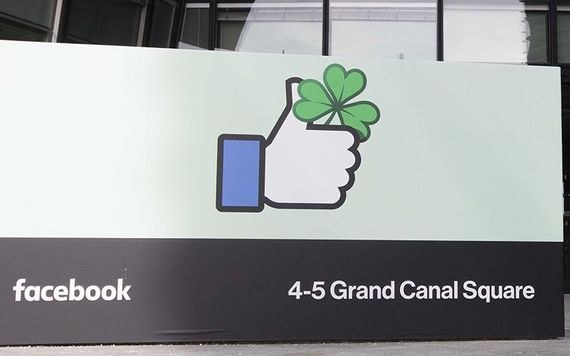It's true! The Tweeterer-in-chief is right Facebook is denying even the most offensive posters their Constitutional right to free speech by pulling their posts
This is what it’s come to. We have a president who has expressed public sympathy for a person named Paul Joseph Watson, who seems to believe that the Sandy Hook school shooting and the Virginia Tech massacre and the Boston Marathon bombing were all intricate hoaxes pulled off by all-knowing, all-seeing government operatives.
Or something. Maybe. What we do know is that Watson has either expressed or supported some of the more vile ideas of our age, which earned him the distinction this week of being one of a handful of, uh, provocative thinkers banned by Facebook.
And our president has no problem standing up for a piece of trash like this. Who, by the way, isn’t even a U.S. citizen!
Read more: Joe Biden starts catfight with Beto O’Rourke over who is more Irish
None of which stopped Trump from bashing Facebook for denying Watson and others the free speech rights outlined in the U.S. Constitution.
Did I mention that Paul Joseph Watson is a Brit?
How crazy are things getting? Our tweeter-in-chief actually has a point here.
No, not in defending indefensible pinheads like Watson, or Infowars’ Alex Jones. Or by suggesting that Facebook is denying folks their First Amendment rights. Does the president of the United States really need to brush up on some of the finer points of the Constitution?

Facebook HQ in Ireland.
Like, you know, Facebook is a private site and they can kind of do whatever they want to you once you click to abide by their rules? Crying First Amendment rights here is a bit like a kid declaring that his free speech rights have been abrogated because his Mommy told him to shut up.
Nevertheless, once again confirming the rule that even broken clocks are right twice a day, Trump is right to call out Facebook. Because the only thing worse than all of these weirdos and hatemongers spreading their filth across Facebook is the prospect of hundreds of nerds out in Silicon Valley deciding what is or what is not hateful speech.
Consider this: Let’s say you stumble across the documentary The Miami Showband Massacre on Netflix, about what appeared to be British collusion in a horrific ambush in Northern Ireland which left three members of the beloved Dublin-based music group dead. So maybe you take to Facebook with some heated words about the Brits and The Troubles and armed struggle. And perhaps someone responds with some even more heated words about “the Irish” and their birthrates and their pope.
Hate speech?
A refashioned version of a Celtic Cross “is one of the most important and commonly used white supremacist symbols,” according to the Anti Defamation League. Imagine some ding-a-ling in California spending even a second wondering if the Celtic Cross on your grandfather’s Facebook page is a symbol of Irish pride or Nazi sympathy.
A frank discussion about whether or not the Irish were once slaves, and how and why that might be relevant to today’s debates about race? A rousing debate about Catholicism and pedophile priests and sexual orientation? Lyrics to Irish rebel songs that advocate violence and revolution?
All of this can very easily veer into territory that may or may not be hate speech.
Again, let’s be clear: The world would be a better place without the paranoid ramblings of Paul Joseph Watson or Louis Farrakhan. But too many people are blaming Facebook and other social media sites for the fact that we are, unfortunately, stuck with the likes of Watson and Farrakhan.
Knocking them off of Facebook changes nothing about that. They’ll simply find another site, or begin using symbols (like Celtic crosses) or coded language (like “88,” which refers to the eighth letter of the alphabet twice -- HH, or “Heil Hitler.”)
The real problem with these social media sickos is that there are millions of other sickos out there who are actually interested in what they have to say.
Not even Mark Zuckerberg can do much about that.
Read more: Trump’s Ambassador to Ireland pick endorsed by US Senate committee
Do you agree? Should all people be afforded freedom of speech online, despite their hateful and often false opinions?




Comments